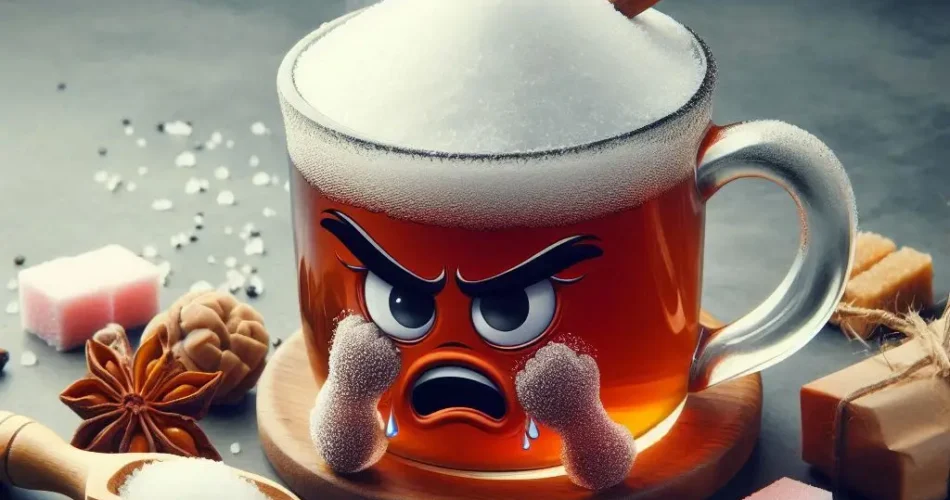If you’re a tea lover, you’ve probably come across that moment when the bitterness of your cup hits a little too hard. Whether it’s your morning black tea or an afternoon green blend, that bitter aftertaste can sometimes be overwhelming. You might be tempted to reach for sugar to mask the bitterness, but what if I told you there’s a better way? The answer might just be as simple as adding salt, not sugar.
In this article, we’ll explore why salt can be the secret weapon to transform your tea experience, and why it could be a healthier and more effective alternative to sugar.
Why Tea Can Taste Bitter
Before diving into why salt can fix your bitter tea, let’s understand why tea can taste bitter in the first place.
The Role of Tannins in Tea
Tea contains compounds called tannins, which are responsible for that bitter taste. When tea leaves are steeped in hot water, tannins are released, and the longer the brew time, the more tannins are extracted. This can lead to a sharp, dry flavor that many people don’t find pleasant.
How Brewing Time Affects the Taste
The bitterness of tea can also be influenced by how long the tea is brewed. Over-steeping your tea, especially black or green tea, can bring out more of the tannins, which leads to an overly bitter taste. So, if you’ve been brewing your tea for too long, you might be unwittingly making the problem worse.
The Sugar Fix – A Common Solution, But Not Always Ideal
Sugar is the most common remedy for bitter tea. However, while it might sweeten your drink, it doesn’t necessarily solve the underlying issue of bitterness.
Why Sugar Doesn’t Always Solve the Issue
Sugar can mask the bitterness, but it doesn’t address the cause. You’re essentially just covering up the flavor, not neutralizing it. While you can make your tea taste sweet, the bitterness still lurks in the background, and your body has to process all that extra sugar.
Health Concerns with Excess Sugar
Adding sugar to your tea regularly can lead to a host of health problems. High sugar intake is linked to weight gain, diabetes, and other metabolic issues. So while sugar can provide a quick fix, it’s not the best long-term solution for both your tea and your health.
Why Salt Might Be the Better Alternative
Now, let’s talk about salt – yes, salt in your tea. It might sound strange at first, but hear me out. Salt has some pretty cool properties that can enhance your tea experience.
Salt Can Balance and Enhance Flavors
Salt doesn’t just make things salty; it can also balance and enhance other flavors in your food and drinks. In fact, salt can actually reduce the perception of bitterness, making it an effective way to mellow out your tea without relying on sugar.
Scientific Reasoning Behind Salt’s Effect
Research has shown that small amounts of salt can help block the taste receptors that detect bitterness. Essentially, salt can smooth out the harsh notes of tannins, making your tea more enjoyable without adding sweetness.
How Adding Salt Affects Tea’s Taste
So how exactly does salt work its magic on your tea?
The Chemistry Behind Salt in Tea
When you add salt to tea, it doesn’t just make it salty. It interacts with the bitter compounds (the tannins) in the tea, altering the way your taste buds perceive them. The salt doesn’t eliminate the bitterness entirely, but it makes it far less noticeable, creating a smoother and more balanced flavor profile.
Salt Enhances Sweetness Without the Sugar
One of the amazing things about adding salt to your tea is that it can enhance the sweetness without adding any sugar. Salt helps to bring out the natural sweetness in the tea, which means you can enjoy a flavorful cup without any added calories or sugar crashes.
How to Add Salt to Your Tea Correctly
Okay, so you’re convinced that salt could be the answer to your bitter tea woes. But how do you actually add salt to your tea in the right way?
How Much Salt Should You Use?
A little goes a long way. Start by adding just a pinch of salt to your cup of tea. Overdoing it can make your tea too salty, which defeats the purpose. Experiment with small amounts until you find the right balance for your taste.
Best Type of Salt for Tea
Not all salt is created equal. While regular table salt will work, opt for a finer sea salt or Himalayan pink salt for a cleaner taste. These salts tend to dissolve more evenly in tea and provide a smoother flavor profile.
When Should You Add Salt to Your Tea?
Timing is everything when it comes to adding salt.
The Right Time During Brewing
For the best results, add the salt just after the tea has brewed, before you take your first sip. Stir it gently to ensure it dissolves completely. This allows the salt to balance the flavor before it hits your taste buds.
How to Test the Perfect Salt Amount
It’s all about trial and error. Start with a pinch and test your tea. If it’s still too bitter, add a tiny bit more salt. If it’s too salty, you can always dilute it with a bit of water or tea.
Benefits of Using Salt in Tea
Besides just improving the taste, there are other reasons to consider adding salt to your tea.
A Lower-Calorie Option
Unlike sugar, salt adds no calories to your tea. So if you’re watching your calorie intake but still want to improve the flavor, salt is a much better choice than sugar.
Enhanced Hydration
Salt can also help your body absorb water more efficiently, which means you might stay better hydrated when sipping on a salted cup of tea. This can be especially beneficial after a workout or during hot weather.
